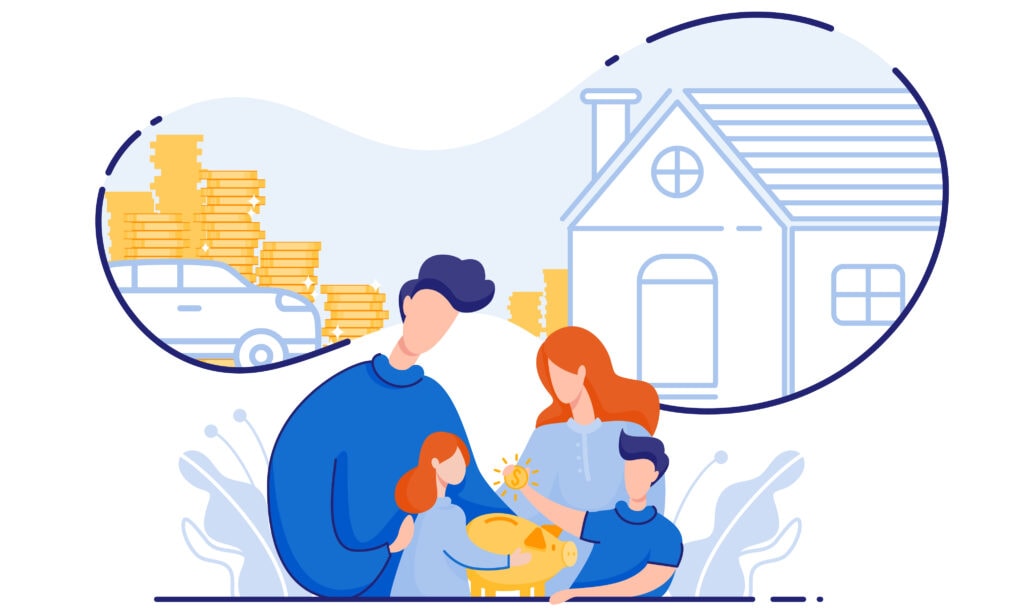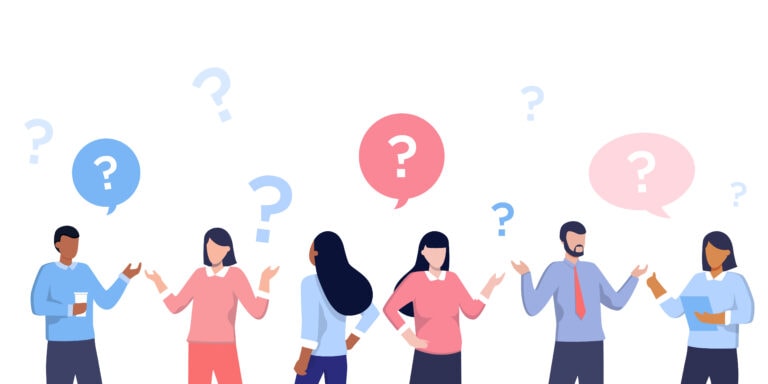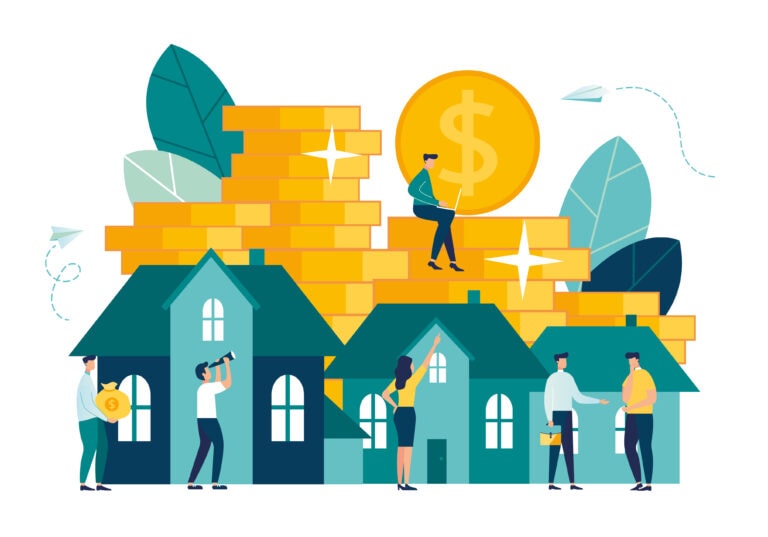Is Now a Good Time? | What’s My Credit Score? | Is My Income Stable? | How Much Debt Do I Have? | What Are the Costs? | How Much Should I Save? | Will Homeownership Align With My Lifestyle? | How Long Will I Stay? | How to Find a Real Estate Agent
Deciding if you’re ready to buy a house comes with major personal and financial implications. Just because purchasing a home seems like the responsible thing to do — or what you’re supposed to do at a certain stage of life — may not mean you’re ready.
On the other hand, you might be more ready than you think. But if homeownership doesn’t align with your lifestyle or goals, buying a house can be more trouble than it’s worth.
Factors completely out of your control – like housing inventory and mortgage interest rates – can also dictate whether it’s a smart time to buy a house.
These nine questions will help you determine for yourself whether you’re ready to become a homeowner.
Aside from these questions, we highly recommend getting in touch with a real estate agent early on to help you understand your local market.
1. Is It Smart To Buy a House Right Now?
Start by considering the real estate market as a whole and in your preferred city or neighborhood. Zillow has a suite of tools to show you typical home values, forecasts, inventory and more for any city or zip code. A simple search will give you a good idea of whether it’s a buyer’s or seller’s market, and whether you can realistically afford to buy in that area.
If there is a large volume of inventory, it’s likely a buyer’s market and home prices may be lower than normal. Low inventory signals a seller’s market where homeowners are more demanding and buyers may need to offer over asking price for homes.
Don’t forget about the current economic climate and interest rates. If interest rates are high, that may impact your ability to buy a home.
Finally, consider the time of year. More houses go on the market in the spring, and this can improve your chances of finding the right home at the right price. That said, winter is often less competitive for buyers looking to make their way into a seller’s market.
An area real estate agent can demystify the local market and evaluate whether it’s a good time to buy a house. Start interviewing top agents in your area!
2. What Is Your Credit Score?
Mortgage lenders typically require borrowers to have a credit score of at least 620 to qualify for a conventional loan.
However, some government loans accept credit scores as low as 500 with a large enough down payment.
» Learn More: Can I Buy a House With a 600 Credit Score? Here Are Your 4 Best Loan Options
Depending on your current score, you may need to pay down debts or otherwise improve your credit profile before you can buy a house.
Access your credit score for free by signing up for a platform like CreditKarma or buy your score through FICO. Many credit card companies also provide free credit score updates to cardholders.
|
🙋 What is a Credit Score? A credit score is a number ranging from 300 to 850 that tells lenders how likely you are to pay a loan back on time. A high credit score indicates confidence that you can pay a given loan back on time, and limited risk for the lender. The higher your credit score, the more likely you are to get approved for loans – and at lower interest rates. Your credit score is based on:
|
3. Is My Income Stable?
When reviewing your application, mortgage lenders consider your income and job stability to assess your ability to make on-time payments. But income stability should also be a concern for you when determining whether you’re actually ready to buy a house.
Determine how long you have been in your job and industry. Is it a stable role, company and industry? If you lose your job, do you feel confident you’ll be able to find one again quickly?
Ultimately, you don’t want to qualify for a mortgage based on a job that might disappear in six months.
Also, consider the type of income you have – lenders prefer W-2 employment and impose additional requirements for contract workers and other non-traditional employment.
4. How Much Debt Do I Have?
Ideally, you should not buy a house if you have other outstanding debts.
But this isn’t always feasible, so it’s important to know exactly how much debt you have before committing to the costs that come with homeownership. Understanding your debt obligations can also provide insight into how lenders will evaluate your mortgage application if you do decide to buy a home.
First consider your debt-to-income ratio, also referred to as DTI. This number represents the ratio of all of your monthly debt payments divided by gross monthly income. Your DTI must typically be 50% or less to qualify for a conventional mortgage, but requirements vary by lender and loan type.
|
Find Your Debt-to-Income Ratio – Example |
|---|
|
Step 1: Add up all monthly debt payments
Total Monthly Debt Payments: $1,870 |
|
Step 2: Divide by gross monthly income $1,870 ÷ $6,000 = 31% (Qualifies for Mortgage 🎉) |
Lenders also apply the 28/36 rule when making lending decisions. This means that your mortgage payment should be more than 28% of your monthly pre-tax income, nor account for more than 36% of your total debt.
5. What Are the Costs of Buying a House?
Monthly mortgage payments aren’t the only cost of buying a home. Closing costs for buyers are usually 3-6% of your total mortgage amount, and they’re one of the most common things overlooked when buying a house.
You’ll also have to pay additional, regular expenses like:
-
Taxes
-
Homeowners insurance
-
Private mortgage insurance (if your lender requires it)
-
HOA fees
Once you’re a homeowner, you’ll also face costs associated with home repairs, maintenance, and other hidden expenses — an average of $15,400 annually. Not to mention, these projects take time and resources to do them yourself, or spending more money to hire professionals.
6. How Much Money Should I Save Before Buying a House?
Even if you’re ready to cover the monthly mortgage and carrying costs for a home, you’ll also need cash for a down payment.
Your required down payment will depend on the type of mortgage you use. Ideally, your down payment would be at least 20% to avoid the additional cost of private mortgage insurance (PMI). But it’s not feasible for everyone.
Fortunately, some mortgages only require a 0-3% down payment (like those available to first-time homebuyers).
|
🚨 Saving Tip: Don’t Forget Emergency Funds Emergencies happen. Ask yourself whether you have a sufficient emergency fund to cover at least six months of living expenses in a new home. This can help you cover living expenses and mortgage payments even if your income is interrupted. |
» Get More Detail: How Much Money Should I Save Before Buying a House?
7. Does Buying Make Sense for My Lifestyle?
Homeownership isn’t consistent with everyone’s lifestyle choices or goals. According to a survey by the Clever Data Center, one in eight homeowners say the benefits of homeownership aren’t worth the hassle.
Before searching for a new place to live, consider what you’re hoping to get out of homeownership. Start by asking these questions:
-
What am I hoping to gain from this move? Consider why you need to move. Do you need extra space or want to be closer to work or a good school district? Will renting help you accomplish the same goals?
-
Will I have to make lifestyle sacrifices to cover the mortgage payment? Consider whether these sacrifices will negatively impact your quality of life.
-
Can I afford a home in my preferred city or neighborhood? For example, will you be able to live close to friends, family, or amenities that are important to you? Buying a home should be a long-term commitment. If you can afford rent in your preferred neighborhood but will have to move elsewhere to afford a purchase, homeownership may not be a good option.
-
Do I have any other long-term goals that will be delayed by a home purchase? If you are planning to go back to school, start a business, or commit to another long-term goal, it may not be a good time to buy a home.
8. How Long Do I Plan to Stay in the Home?
The general rule of thumb is that you should plan to live in your new house for at least five years before selling it.
This allows the home’s value to appreciate enough to cover closing costs and yield a profit if you sell.
But that’s an unrealistic commitment for some. At the very least, if you stay in a home for two years, you’ll avoid heavy capital gains taxes.
If you don’t plan to own the home for long, it may be tough to turn a profit. Depending on the market, you may even lose money on agent commissions, which typically hover around 6% of the sale price.
Plus, moving is expensive (and exhausting)! You don’t want to buy a home and then regret it.
9. Do I Know How To Find a Real Estate Agent?
A knowledgeable real estate agent can make the home buying process much easier – especially for first-time home buyers. Not to mention, working with an agent doesn’t cost you a dime as a buyer!
A local agent can tell you if a home is well-priced, help you draw up a winning offer, negotiate a contract, and walk you through due diligence and closing. With a realtor, you won’t be confused about anything you sign, or have to nod and pretend you know what escrow means. They’ll answer all your questions, and guide you along the way.
Recommended Reading
Is it Smart to Buy a House Right Now?
The answer depends on a variety of market and personal considerations. Start by looking at the real estate market as a whole and in your preferred city or neighborhood. Note things like typical home values, forecasts, and inventory. Don’t forget to consider mortgage interest rates and broader economic trends as well. Learn more about how to decide if you’re ready to buy a house.
How Much Money Should I Save Before Buying a House?
Make sure to save enough more for a down payment, as well as closing costs. Your down payment will be a percentage of overall mortgage and can vary widely from 0-20% depending on the type of mortgage you use. Closing costs are typically 3-6% of your loan amount. Learn more about the costs of buying a home.



